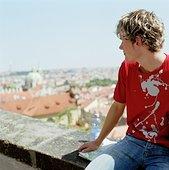
"We're looking back to the straightforwardness of life." Dariusz, 24, Poland
In Central Eastern Europe (CEE), society became freer, open and rich with new opportunities as it ushered in the EU. But this freedom brought with it a sense of doubt as cultural identity has become increasingly disputed and displaced within a homogenised Europe. Young men are joining older generations in their taste for nostalgia, favouring symbols of traditional sensibility. Young men feel they have little effect upon the changes occurring around them, they now seek stability, a sense of belonging and uniqueness not long after experiencing the recent overdose of autonomy in their lives.
Men in CEE desire things that reflect their local culture. Communist brands like Tisza trainers, Kofolo cola and Ludwik laundry detergent, together with local celebrities and role models, are being consumed to reinforce perceivably more stable values, to provide a sense of confidence whilst they continue to live opportunity-rich lifestyles. Interestingly, younger men are fond of nostalgic brands they never even grew up with. Once enthralled by the new Western products available in their stores, the products of communism suddenly seem like symbols of the new youth. Nevertheless, this may simply be an expression of protest over the social uncertainty that has come with the fall of communism; nobody really wants the old system back.
No comments:
Post a Comment